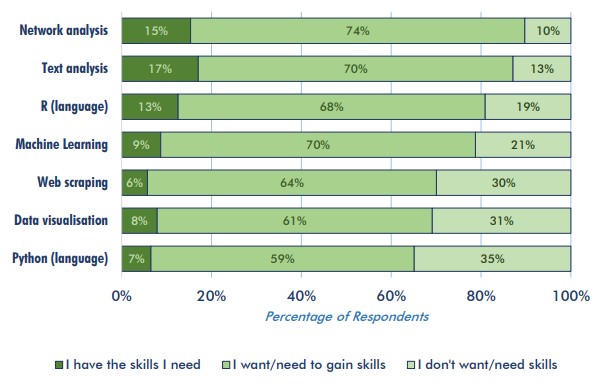74% of social researchers report that they want or need to learn data science, according to a recent survey commissioned by SAGE Campus*. With researchers increasingly wanting and expecting to work with big data, what does this mean for the higher education institutions teaching social science?
Big data and new technology is set to revolutionize the field of social science, offering researchers the opportunity to work with vast datasets and new computational methods. However, social scientists need an array of new data science skills to fully realize this opportunity.
SAGE Campus commissioned a survey within our existing contacts in the research community to investigate how familiar researchers are with “data science” and “computational social science” and their interest in gaining these skills.
Desired skills
The key finding of the survey was that the majority (74%) of respondents reported wanting or needing to further develop their data science and computational social science skills, while only 19% of respondents reported that they did not want or need these skills.
Interestingly, only 6% of respondents reported already having the data science skills they need. This suggests that efforts still need to be made within the field of social science to equip the other 74% of researchers with the skills they want/need to embrace the data revolution.
When asked about specific skills, network analysis and text analysis were the two most sought after data science skills for researchers. Nearly 90% of respondents reported they either already had or want/need to gain skills in both these areas. This was closely followed by skills in the R programming language, where 81% of respondents reporting that they either have or want/need these skills.
Figure 1: Percentage of respondents who have, want/need or do not require specific computational social science skills
Motivations for learning or not learning data science
The respondents who reported wanting to develop data science skills noted the below five main motivations for learning.
Personal development (75%)
Career progression (66%)
Interest in this area (57%)
Necessary for my current role (31%)
Others in my field are interested in this area (17%)
Meanwhile, not needing data science skills in their current role and uncertainty on whether the skills would be useful were the most common motivations for the 19% of respondents who reported not wanting to learn data science.
The uncertainty around whether the skills would be useful could be due to lack of awareness. The majority of respondents were familiar with the terms “data science and “computational social science”, however, 42% respondents reported that they were not at all familiar with “computational social science” and 32% were not at all familiar with “data science”. This minority may find themselves lagging behind as big data and new technologies continue to revolutionize the field of social science.
What could this mean for higher education institutions?
The increasing interest among social researchers to learn data science poses a new challenge for higher education institutions. It was previously uncommon for social science faculties to offer data science training to their students or faculty - and perhaps equally uncommon for there to be appetite for it.
Clearly, this is changing. As a result, already some higher education institutions have started to upskill social science students in programming languages, and initiatives like Nuffield and the ESRC’s Q-Step initiative in the UK have launched in recent years, aiming to improve quantitative social science skills of postgraduates and undergraduates.
Higher education institutions may experience demand from social science faculty to be upskilled in data science and the latest methods to support their professional development. Similarly, institutions may need to respond to increasing demand from students who, for example, want to work with text from the web - and expect training to do so.
Furthermore, the finding that career progression is a motivation for learning data science for 66% of respondents may be of particular interest to higher education institutions. Ensuring the employ-ability of students is a top priority for higher education institutions, and they may want to look to incorporate data science skills training into their social science programmes to offer students a competitive advantage in the job market.
The benefits of online courses
Data science skills are notoriously tricky and time-consuming topics to teach, and finding face to face training is difficult and costly. Institutions wanting to help faculty and students to embrace the data revolution could look to offer online data science courses as an efficient way to respond to the changing field.
*SAGE Campus commissioned a survey of over 1,000 contacts in the research community. The analysis was conducted by Brendan Read, ISER PhD Student at the University of Essex.
Download the survey INFO-GRAPHIC!
Leave your details at the form below to instantly download our survey results info-graphic.


